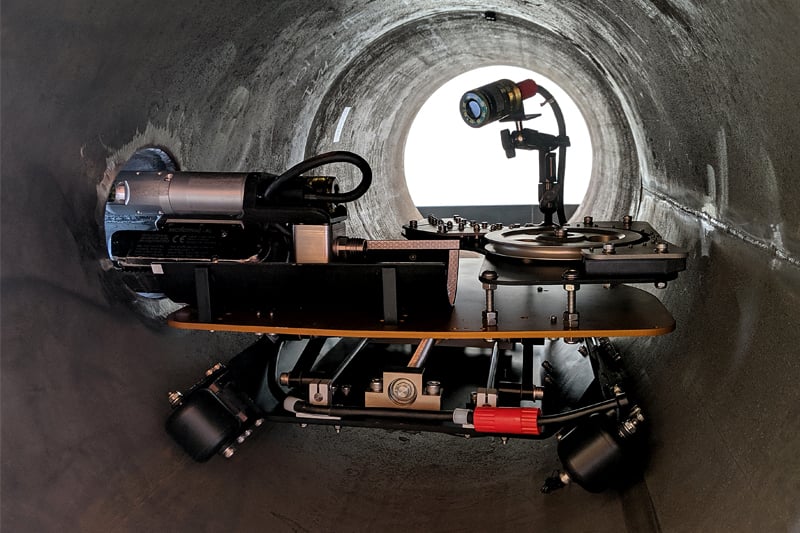The Advantages of Robotics for Inspection & Maintenance In The Petroleum & Petrochemical Industries

The time of the robot is well and truly upon us. The strategic use of such technology can bring about significant safety advances and cost efficiencies. This is particularly true when it comes to the production of within the resource industry and other tome sensitive operations. .
However, because of the value of these industries, with assets totaling billions of dollars, it’s understandable that those held responsible for ensuring continued profits are decidedly cautious when it comes to embracing new technology.
The use of robots for inspection and maintenance has rapidly become the norm for many operators who have invested in undertaking operations safely and efficiently. As more and more prove the advantages of technology, such solutions are becoming even more widespread.
Inspection and maintenance challenges
Historically, achieving efficient inspection and maintenance of assets is a necessary but expensive task that needs to be carried out on a regular basis. Challenges posed include:
- Significant downtime of assets causing reduced revenue
- High costs associated with the opening, inspection, cleaning and maintenance of assets
- Lengthy preparation periods to set up scaffolding and vent toxic gases to create a safe environment for human entry
- The risk to human life when entering confined spaces and non or reduced oxygen atmospheres
- The high cost of specialist inspection and maintenance teams
- Worker compensation following accidents or incidents
- The risk of human error during inspection
- Inadequate visualisation of certain structures that are inaccessible for humans
Such challenges have meant that inspections and necessary maintenance can take weeks – even months – to complete. While this is taking place revenue declines, so the need for speed is paramount. In addition, such challenges create little enthusiasm for companies to carry out proactive inspection over and above what’s required by legal industry standards.
Enter the robots
Rapidly advancing technology over the past decade has brought us to an era that’s truly able to overcome many of these challenges. Today, robots such as crawlers and drones are able to reduce multiple challenges of inspection and maintenance, providing the opportunity for companies to not only meet health and safety requirements, but to exceed them. The benefits have become clear, proactive asset analysis associated reduction in risk and reduced maintenance costs.
Advantages of using robotic technology for inspection and maintenance
Small, agile robots, drones, quadcopters and artificial intelligence now make it possible to not only inspect the various components of assets, but, in some cases, carry out tasks autonomously. So advanced is AI that some machinery can even carry out necessary maintenance that’s been detected.
The advantages this brings to these multi-billion dollar industries is immense:
- Eliminating or minimising the need for human entry into hazardous environments, therefore significantly reducing risk. This also brings about associated lowered insurance premiums
- Reducing or negating requirements for venting enclosed areas and erecting scaffolding, therefore shortening the downtime of assets
- Dramatically reducing environmental risks
- Superior collection of data due to the elimination of human error or the inability to visualize hard to access areas
- Increased quality of data makes for better decision making and considerations for necessary maintenance and inspection schedules
Solution driven robotics
Such robotics continue to evolve. Today it’s possible to use a single piece of kit to carry out multiple inspection and maintenance tasks. For instance, modular crawlers can be configured for the task in hand by changing the setup as necessary with multiple sensors, controllers, cameras, tracks and manipulators. Ariel vehicles can quickly inspect not only exterior locations, but large, high interior spaces as well.
In a global marketplace that’s predicted to reach over $7 trillion US dollars* (Oil & Gas) by 2024 and $958.8 billion** (Petrochemical) by 2025, companies, although sensibly judicious in their eagerness to take advantage of such technology, are fast-becoming aware of the competitive edge it can bring.
Perth based technical equipment provider, Nexxis, are at the forefront of such technology. We have a team that is dedicated to assisting companies to discover and understand the latest tech which can streamline operations, increase safety and reduce costs. Nexxis is the go-to provider for inspection and maintenance solutions for companies around the globe.
It’s this industry specific, innovative approach from a team that understands the crucial importance of reducing downtime that makes the Nexxis difference. Find out more by contacting us today.
** https://www.grandviewresearch.com/press-release/global-petrochemical-market
